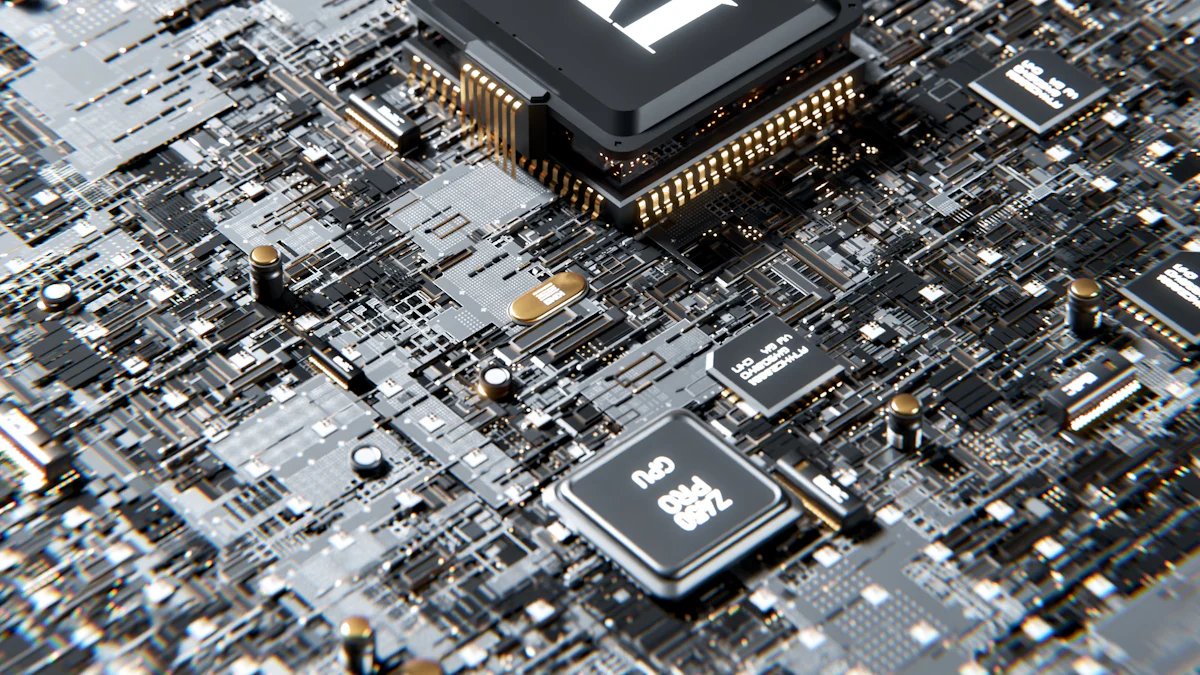Optimization and Intelligent Management in Europe’s Electronic Components Supply Chain

Supply chain optimization holds immense importance in today's fast-paced world. The European electronic components industry exemplifies this need, with its intricate networks and high demand for efficiency. Intelligent management transforms modern supply chains by enhancing decision-making and operational efficiency. The integration of advanced technologies plays a pivotal role in achieving these objectives. The European supply chain analytics market is projected to grow at a 15.8% CAGR from 2023 to 2030, reaching USD 4.07 billion by 2030. This growth underscores the vital role of intelligent management in the Electronic Components Supply Chain.
Understanding the European Electronic Components Supply Chain

The European electronic components supply chain involves a complex network of key players and stakeholders. Each group plays a vital role in ensuring the smooth flow of components across the continent.
Key Players and Stakeholders
Manufacturers
Manufacturers form the backbone of the electronic components supply chain. These entities produce essential components that power various electronic devices. The production process requires precision and efficiency. Manufacturers often face challenges related to sourcing raw materials and maintaining quality standards.
Suppliers
Suppliers act as the crucial link between manufacturers and distributors. They provide the necessary materials and components to manufacturers. Suppliers must ensure timely delivery and maintain strong relationships with both ends of the chain. Effective supplier management can significantly impact the overall efficiency of the supply chain.
Distributors
Distributors play a pivotal role in the electronic components supply chain by connecting suppliers and end-users. They manage inventory, logistics, and distribution channels. Distributors must adapt to market demands and technological advancements to remain competitive. Efficient distribution strategies can lead to faster delivery times and improved customer satisfaction.
Current Challenges
The electronic components supply chain in Europe faces several challenges that require strategic solutions.
Supply Chain Disruptions
Supply chain disruptions pose significant risks to the electronic components industry. Natural disasters, geopolitical tensions, and pandemics can all impact the flow of goods. Companies must develop robust contingency plans to mitigate these risks. A case study of a leading Italian business-to-business multinational company highlights the importance of managing complexity for sustainability in the electronics sector.
Regulatory Compliance
Regulatory compliance presents another challenge for the electronic components supply chain. Companies must adhere to strict regulations and standards set by governing bodies. Non-compliance can result in fines and reputational damage. Businesses need to stay informed about regulatory changes and implement necessary measures to ensure compliance.
Technological Advancements
Technological advancements continuously reshape the electronic components supply chain. Companies must embrace new technologies to enhance efficiency and competitiveness. Implementing technology-driven solutions can optimize supply chain operations. An AI-enhanced BOM sourcing optimization model offers comprehensive solutions for efficient procurement processes.
Strategies for Optimization
The Electronic Components Supply Chain in Europe demands innovative strategies for optimization. Implementing advanced technologies and enhancing collaboration can significantly improve efficiency and responsiveness.
Implementing Advanced Technologies
Automation
Automation transforms the Electronic Components Supply Chain by streamlining operations. Automated systems handle repetitive tasks with precision and speed. This reduces human error and increases productivity. Factories use robots to assemble components quickly. Automated inventory management ensures accurate stock levels. Companies save time and resources through automation.
Artificial Intelligence
Artificial Intelligence (AI) plays a crucial role in optimizing the Electronic Components Supply Chain. AI analyzes vast amounts of data to predict demand and manage risks. Companies use AI to make informed decisions about production and distribution. Predictive analytics reduce environmental impact and optimize transportation routes. AI enhances operational efficiency by identifying bottlenecks and suggesting improvements.
Internet of Things (IoT)
The Internet of Things (IoT) connects devices and systems in the Electronic Components Supply Chain. IoT sensors monitor equipment and track shipments in real-time. This provides valuable insights into the supply chain's performance. Companies use IoT to prevent equipment failures and ensure timely deliveries. Real-time data from IoT devices helps businesses respond quickly to changes in demand.
Enhancing Collaboration and Communication
Integrated Systems
Integrated systems improve collaboration in the Electronic Components Supply Chain. These systems connect different parts of the supply chain, allowing seamless information flow. Businesses use integrated systems to coordinate activities and share data. This leads to better decision-making and increased efficiency. Integrated systems help companies adapt to market changes and customer needs.
Real-time Data Sharing
Real-time data sharing enhances communication in the Electronic Components Supply Chain. Companies share information instantly with suppliers and distributors. This ensures everyone stays informed about inventory levels and delivery schedules. Real-time data sharing reduces delays and improves customer satisfaction. Businesses use this information to optimize their operations and meet market demands.
Intelligent Management Practices

Intelligent management practices revolutionize the supply chain landscape. These practices harness data and technology to predict trends and optimize processes. Companies in Europe are increasingly adopting these methods to stay competitive.
Predictive Analytics
Predictive analytics plays a pivotal role in supply chain management. By analyzing historical data, companies can anticipate future demands and mitigate risks.
Demand Forecasting
Demand forecasting uses predictive analytics to determine future product needs. Companies analyze past sales data to predict upcoming demand. This helps businesses maintain optimal inventory levels. Accurate demand forecasting reduces the risk of overproduction and stockouts. Businesses can allocate resources more efficiently, leading to cost savings.
Risk Management
Risk management involves identifying potential supply chain disruptions. Predictive analytics assesses various risk factors, such as supplier reliability and market volatility. Companies use this information to develop contingency plans. Proactive risk management minimizes the impact of unforeseen events. Businesses can maintain continuity and avoid costly delays.
Sustainable Practices
Sustainable practices focus on reducing environmental impact. Companies implement strategies that promote resource efficiency and eco-friendly logistics.
Green Logistics
Green logistics aims to minimize carbon emissions in transportation. Companies optimize delivery routes to reduce fuel consumption. Electric vehicles and alternative fuels contribute to greener logistics. Businesses also prioritize local sourcing to decrease transportation distances. Green logistics enhances brand reputation and aligns with sustainability goals.
Resource Efficiency
Resource efficiency involves using materials and energy wisely. Companies adopt technologies that reduce waste and conserve resources. Efficient manufacturing processes lower production costs and environmental impact. Businesses recycle materials and use renewable energy sources. Resource efficiency supports long-term sustainability and profitability.
Benefits of Optimization and Intelligent Management
Optimization and intelligent management in the electronic components supply chain offer numerous advantages. These benefits enhance efficiency and boost customer satisfaction.
Increased Efficiency
Efficient supply chains streamline operations and reduce waste. Companies that optimize their supply chains see significant improvements.
Cost Reduction
Cost reduction stands as a primary benefit. Supply chain optimization services help companies achieve lean production. Just-in-time inventory practices minimize excess stock. Better resource allocation leads to lower operational costs. Companies save money by reducing unnecessary expenses.
Time Savings
Time savings result from efficient supply chain management. Automation speeds up processes and reduces delays. Real-time data sharing ensures quick decision-making. Companies fulfill orders faster, improving overall productivity. Time savings translate into increased output and profitability.
Improved Customer Satisfaction
Customer satisfaction improves with optimized supply chains. Companies meet customer demands more effectively.
Quality Assurance
Quality assurance becomes more reliable. Optimized supply chains maintain consistent product quality. Better supplier performance ensures high-quality materials. Customers receive products that meet their expectations. Quality assurance builds trust and loyalty among customers.
Faster Delivery Times
Faster delivery times enhance customer experience. Efficient logistics reduce shipping delays. Companies use advanced technologies to track shipments. Customers receive orders promptly, boosting satisfaction. Faster delivery times give companies a competitive edge.
In conclusion, optimization and intelligent management transform supply chains. Companies benefit from increased efficiency and improved customer satisfaction. These advantages drive success in the electronic components industry.
Optimization and intelligent management in Europe's electronic components supply chain are crucial for success. Businesses must embrace these strategies to remain competitive. The future outlook shows a shift towards digital integration and sustainable practices. Predictive analytics will play a key role in creating efficient and ethical supply chains. Industry stakeholders should act now. Adopting advanced practices will unlock new opportunities and reduce costs. Companies that adapt quickly will thrive in the global market. Embracing these changes will ensure resilience and agility in an ever-evolving industry landscape.
See Also
Efficient Strategies for Supply Chain Challenges in High-Tech Manufacturing
Maximizing Cost Efficiency in Supply Chain Economics
Tomorrow's Logistics Revolution with AI in the Supply Chain
Harnessing Innovation for Efficient AI Supply Chains
Collaborative Innovation for Stronger Supplier Bonds in High-Tech Manufacturing
